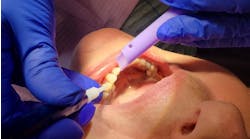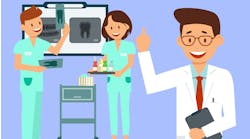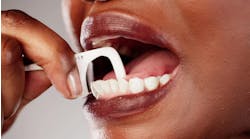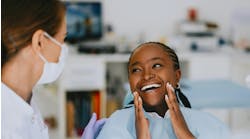Dental hygienists’ role in cancer treatment post-lockdown
COVID-19 had a ripple effect on preventive health care that has directly impacted dental hygienists. According to the CDC, roughly one third of adults did not have a physical appointment with their primary care physician during 2020–2021.1 There were 85% fewer screenings than the normal volume for various cancers, and management of many chronic diseases declined.2
Early cancer detection and diagnosis decreased 14%, which led to an increase in more advanced stage cancers today.3 The delayed screenings were a result of the precautions put in place to manage the pandemic—closing hospitals to tests and surgeries, lack of PPE, and no in-person appointments. When cancer is detected in its early stages, treatment is more manageable, and if surgery is indicated this can be performed with a more predictable prognosis.4 This has impacted all health-care professionals, and as those who see patients more often than other health-care providers, it’s had many implications for dental hygienists.
You might also be interested in
The importance of oral care during cancer treatment
The dental hygienist’s role in cancer care
Our important role
We need to be prepared for the role we play in patients’ lives and be aware of the impact that the last three years have had on diagnosing and screening cancer. Some key information gathered from a patient will help develop a dental care plan. This includes the type of cancer, stage, current therapy, and if they have any side effects.5 Prior to patients starting treatment, it’s important to address their oral health needs. Hygiene therapy, teeth extraction with poor prognosis, and treating carious lesions are our main priorities.5
Dental hygiene appointments play a vital role in educating patients about the side effects that can occur during cancer therapy and how to best address them. Each patient needs to be assessed for risk factors. Clinically we can help educate them about xerostomia, mucositis, increased caries risk, oral candidiasis, loss of taste, and nutritional needs.5
Xerostomia patients can use various salivary substitutes, topical fluorides, or products containing xylitol. Mucositis can be managed by avoiding irritating foods, increasing soft foods, and using prescription rinses. Increased risk of caries can be prevented using prescription fluoride and xylitol products. Oral candidiasis can be treated with an antifungal medication. Loss of taste can be managed with zinc supplements. Finally, a nutritional counseling component should be built in with each patient.5
Never underestimate your value
Dental professionals are essential, and we’re the ones who navigated patients’ health in person while other providers remained virtual. Fast-forward three years, and there are some obvious differences compared to prepandemic in treating patients with advanced cancers due to the decline in screenings during the pandemic.6
Having eye-to-eye conversations with patients sets a good tone. You can send note cards to make a connection before and after their visit. Make a note when they will start and complete their treatment. Create reminders so you can make a phone call to let them know you’re thinking of them, and to check if they need guidance for any side effects they’re experiencing.
Practice with empathy and purpose. These qualities are key to human connection. We’re the ones who inform patients how to care for their oral health during cancer treatment. Never underestimate how you can help someone as a dental hygienist. Patients look forward to the conversations during their appointments, particularly since we weren’t allowed to do this for so long during the pandemic.
One of the many things that can help you do your job well as a clinician is to be attentive to the needs of your patients. Learn to be graceful with yourself and your patients. Find something that allows you to regroup every day, such as physical activity, meditation, journaling, counseling, or speaking to a mentor or colleague. Know you’re an essential health-care provider who is impacting patients’ lives, whether it’s for their systemic health, mental health, oral health, or social health. It’s all important.
References
1. Czeisler ME, Marynak K, Clarke KEN, et al. CDC delay or avoidance of medical care because of COVID-19-related concerns, United states, June 2020. Centers for Disease Control and Prevention. September 11, 2020. https://www.cdc.gov/mmwr/volumes/69/wr/mm6936a4.htm
2. Garret A, Seidman B. The impact of the Covid-19 pandemic on the stage of endometrial cancer at diagnosis. Gyn Oncol Rep. 2023;47(6):101-191. doi:10.1016/j.gore.2023.101191
3. Lum SS, Browner AE, Palis B, et al. Disruption of national cancer database data models in the first year of the COVID-19 pandemic. JAMA Surg. 2023;158(6):643–650. doi:10.1001/jamasurg.2023.0652
4. Cancer facts and figures 2019. American Cancer Society. Accessed July 2023. https://www.cancer.org/content/dam/cancer-org/research/cancer-facts-and-statistics/annual-cancer-facts-and-figures/2019/cancer-facts-and-figures-2019.pdf
5. Dsouza R, Kornegay EC. Managing patients undergoing cancer therapy. Dim Dent Hyg. 2021;19(11):36-39. https://dimensionsofdentalhygiene.com/article/manage-patients-undergoing-cancer-therapy/
6. Romatoski KS, Chung SH, Kenzik K, et al. Delay and disparity in observed vs predicted incidence rate of screenable cancer during the COVID-19 pandemic. J Am Coll Surg. 2023;3(9)420-430. doi:10.1097/XCS.0000000000000772







